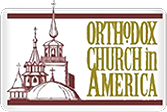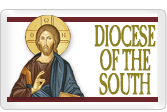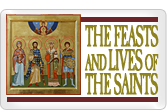One of the Church's most profound theologians and instructors in practical Christian spiritual life, St. Maximus (580-662) left an important government post in the East Roman Empire (Byzantine) under the Emperor Heraclius about 614 to live the rest of his life as a simple lay monk - though his life and teaching were far from simple.
As a theologian, he taught, against those who sought to compromise the Faith for the sake of political and religious unity, that Jesus Christ was the incarnate Son of God, fully divine,and fully human, thus having two complete wills, natures, and energies. For his stubborn confession of Christ the Truth, St. Maximus was persecuted by compromising imperial authorities, put on trial three times, and finally, having had his tongue and right hand with which he had so eloquently defended the Faith cut off, he was sent into exile to what is now Tsageri, Georgia, where he soon died on August 13, 662.
As an instructor in the spiritual life, St. Maximus gave detailed, practical guidance in how to live as a Christian, overcome our sinful passions,and truly love God and our fellow man. Anyone who desires to learn how to live the Christian life in accordance with Christ's commands does well to turn to St. Maximus for that help. Indeed, his writings take up a greater portion of the famous Philokalia, the handbook of Eastern Orthodox spirituality, than those of any other writer.
Some information on his tomb in the Republic of Georgia may be found here: http://orthodoxword.wordpress.com/2013/01/21/the-tomb-of-st-maximus-the-confessor/
The Church honours the memory of the Venerable Maximus with two feasts during the year: January 21 and August 13. Because the latter feast corresponds with the leavetaking of Transfiguration, the celebration of the summer feast of St. Maximus may be transferred to August 12.
St. Maximus was an official in the court of the Emperor Heraclius of the East Roman Empire. About the year 614, after having served the emperor for three years, Maximus, longing for a life of solitude, of hesychia, left his position and became a monk. He lived the rest of his life as a simple monk, never being ordained.
St. Maximus’ keen mind was illuminated through his ascetic struggles, and he wrote extensively about the spiritual life based in the writings of those who had gone before and his own experience of those truths. But in 634, through his association with St. Sophronius, Patriarch of Jerusalem, St. Maximus was enrolled in the struggle against the Monothelite heresy, which taught that Jesus Christ had had only one will—a divine one. But for Christ to lack a human will was to render Him less than fully human. The consequences of this were not merely academic, for as St. Gregory the Theologian had taught, “What is not assumed is not healed.” If Christ had not assumed a human will, then man’s will was not healed by Christ—and it was man’s will above all, perhaps, that needed to be healed. Man could not be saved if Christ lacked a human will. For the rest of his life, and sometimes nearly alone, St. Maximus eloquently defended Christ’s full divinity in the face of political pressure, heretics, and wavering churchmen. He was tried by imperial authorities, condemned, and exiled three times: in 655, 656, and finally, in 662. The last time, his right hand and his tongue, the instruments of his teaching, were cut off. He died in exile shortly afterwards at Tsageria, Georgia, on August 13, 662.
St. Maximus bears the titles “venerable” and “Confessor”. “Venerable” (prepodobnii) is the title given to monastic saints. “Confessor” (ispovednik) is the glorious title given to a saint who has been persecuted and has suffered for the Faith.
One of the Church’s most profound theologians, St. Maximus possessed equally profound insight into the spiritual life which he acquired through his practice of it. True Christian life always consists both of believing and confessing the right doctrine as well as doing the right things or living the right way. In his writings, the intimate relation between theology and spirituality is manifest. Christian spirituality (how one approaches and interacts with God) depends on Christian theology (what is said about God). If the Church’s confession of who God is, and especially, who Jesus Christ is, becomes corrupt or distorted, it cannot but have a corrupting influence on spiritual life.
St. Maximus teaches that there are three faculties of the soul: the rational faculty (mind or nous), the concupiscent (desiring) and the irrascible (temper). There is a proper use for each, and there are misuses of each, which are sinful. Regular misuse results in a sinful habit. To overcome a fixed habit of pleasure related to the concupiscible element, one needs the continual exercise of fasting, vigils, and payer. To overcome a habit of temper, kindness, benevolence, love, and mercy are needed.
Sin in action is preceded by sin in thought. “For unless anyone sins first in thought, he will never sin in deed.” As a result the war with sinful thoughts is far harder to win than the war with sinful actions. To prevail over thoughts, Maximus counsels, “Take care of your passions and you will easily drive thoughts from your mind. Thus for fornication—fast, keep vigil, work hard, keep to yourself. For anger and hurt—disdain reputation, dishonor, and material things. For grudges—pray for the one who has hurt you, and you will be rid of them.”
But what is a passion? “A passion is a movement of the soul contrary to nature either toward irrational love or senseless hate of something or on account of something material.” Furthermore, “the beginning of all passions is love of self, and the end is pride. Self-love is irrational love of the body, and if one eliminates this, he eliminates along with it all the passions stemming from it.” Notice that passion is a movement of the soul contrary to nature, not according to God's design.
About money, St. Maximus says there are three sinful reasons for loving it: “pleasure-seeking, vainglory, and lack of faith. And more serious than the other two is lack of faith. ”There is also a virtuous reason for acquiring money: the financial administrator acquires money “so that he might never run short in relieving each one’s need.”
St. Maximus’ teaching offers us many more spiritual riches than we can recount here. Many of his writings are found in volume two of the Philokalia. His work entitled 400 Chapters on Love should be known and followed by all Christians. He wrote many other works, including 200 Chapters on Theology, and commentaries on the Lord’s Prayer and the Divine Liturgy.
St. Maximus shines as an example both of faithfulness to the Truth and as one who practiced the life he taught to others. His teachings instruct us not only in the mysteries of the highest theology, but also in how to live the Christian life , conquer our passions, attain the love of God and our fellow man, and be deified. Let us honour his memory by receiving his instruction and striving to follow his example in our own time.
The ikos from the canon of Matins for the saint well sums up his life:
The venerable Maximus, whose name means “greatest” and whose way of life was unsurpassed, was born in Constantinople in 580. His parents were of noble lineage and Orthodox and gave him an excellent education. Recognizing his knowledge and virtue, the Emperor Heraclius made him become first secretary and a chief counselor about the year 610. Maximus was loved and respected by the senate and was most competent in his work.
When the Monothelite heresy arose, which taught that Christ had only one human-divine will rather than two wills, one human and one divine, it swept away the Emperor, the Patriarchs of Constantinople and Alexandria, and many others in the court and the East, for there were reasons of politically expediency to adopt it: primarily, to unite Orthodox and Monophysites against first the Persian invaders and later the Muslims. Maximus feared lest he, too, go astray. He also had conceived a deep desire for a life of quiet prayer. He resigned his official duties at court in 614, renounced the world’s glory, and went to dwell as a monk at the monastery in Chrysopolis on the Asian side of the Bosphorus Strait, across from the capital. On account of his progress in virtue in the monastic life, he acquired a disciple Anastasius by 618, and he was chosen abbot. About 625, he left the monastery at Chrysopolois for the monastery of St. George at Cyzicus on the south coast of the Sea of Marmara in modern Turkey His earliest writings date from this time, including several of his great works on the spiritual life.
In 626, Maximus and his monks fled St. George to escape the invading Persian army. He ended up in Carthage of North Africa in 630, having spent time in both Cyprus and Crete along the way. There he met Sophronius, whom Maximus came to regard as his spiritual father, and who was elected Patriarch of Jerusalem in 633.
By this time, the Persians had been defeated, but a new threat arose from the Arabian desert: beginning in 632, the armies of Islam began their inexorable advance which was to persist unbroken for a century. Damascus fell in 635, Jerusalem in 638, Alexandria in 642. The Emperor Heraclius died in 641 without an answer to the new crisis.
In about 640, Maximus, still a simple monk (he was never ordained), began to take a public stand against the heretical compromise positions of the day: Monenergism and Monothelitism. In 645 in Carthage, he engaged in a famous debate with Pyrrhus, a Monothelite, who had been Patriarch of Constantinople but had been driven out after having taken the part of the losing side in a dynastic struggle. Maximus prevailed, and Pyrrhus was reconciled to the Church, received in Rome, and wrote a book confessing the true faith.
Maximus went to Rome in 646 bringing news of the condemnation of Monothelitism by several North African councils. As a result, Pope Theodore formally broke off communion with Paul, Patriarch of Constantinople. In 647, seeking to regain his lost patriarchal throne, Pyrrhus returned to Monothelitism and was excommunicated by Pope Theodore. The emperor Constans II tried to close the ongoing debate about Christ’s wills and energies by forbidding “any discussion of one will or one energy, two wills or two energies” in a decree known as the Typos.
Pope Theodore’s successor Pope Martin convened a council in 649 in Rome to affirm Orthodoxy against imperial heresy. Maximus attended along with 105 most western bishops. The council reaffirmed the doctrine of the Fourth Ecumenical Council at Chalcedon (Christ has two natures, human and divine, united in one person without confusion, without change, without division, without separation) and made explicit the doctrine of two energies and two wills in Christ as the necessary entailment of the doctrine of the two natures. The Typos and other compromise documents were condemned and a list of heretics anathematized. The emperor reacted by having Pope Martin secretly arrested in 653, tried on trumped up treasonous charges, mistreated, defrocked and sent into exile to Kherson in the Crimea, where he died in 655, a confessor of Orthodoxy.
Resistance to the heresy was now virtually reduced to one man, the monk Maximus. He was arrested in Rome in 655 and sent to Constantinople where he was accused of betraying Egypt to the Muslims and of theology error. Unable to prevail against Maximus’s defence, the Emperor had him banished to Bizye in Thrace. Some time later, the Emperor and Patriach made another attempt to win Maximus to their position, but he again prevailed. The Emperor was furious and had him brought back to Constantinople where he had another attempt made to bring Maximus into harmony with them. Failing, he had Maximus exiled a second time.
After five years in his second exile, Maximus and his two disciples were recalled to Constantinople. They were again tried and threatened, beaten and mocked, but they would not renounce the faith. Their persecutors in anger then cut out Maximus’s tongue and cut off his right hand to silence him and sent him off into his third exile to Lazica in Georgia, where he reposed in 662 at the age of 82.
Eighteen years later, the teaching for which he gave his life—the doctrine that the God-man Jesus Christ had two wills and energies to go with His two natures—was vindicated at the Sixth Ecumenical Council in Constantinople in 680, though Maximus’s name was unmentioned in the official documents of the council.
"Love is a good disposition of the soul by which one prefers no being to the knowledge of God. It is impossible to reach the habit of this love if one has any attachment to earthly things." 400 Chapters on Love, 1.1
"If the soul is better than the body, and God is incomparably better than the world which He created, the one who prefers the body to the soul and the world to God who created it is no different from idolaters." 400 Chapters on Love, 1.7
"The work of love is the deliberate doing of good to one's neighbor as well as long-suffering and patience and the use of all things in the proper way." 400 Chapters on Love, 1.40
"What anyone loves he surely holds on to, and looks down on everything that hinders his way to it so as not to be deprived of it. And the one who loves God cultivates pure prayer and throws off from himself every passion which hinders him." 400 Chapters on Love, 2.7
"If you hate some people and some you neither love nor hate, while others you love only moderately and still others you love very much, know from this inequality that you are far from perfect love, which lays down that you must love everyone equally." 400 Chapters on Love, 2.10
"When a person loves someone, he is naturally eager to be of service. So if one loves God, he is naturally eager to do what is pleasing to Him. But if he loves his flesh, he is eager to accomplish what delights it." 400 Chapters on Love, 3.10
"Not so much out of necessity has gold become enviable by men as that with it most of them can provide for their pleasures.
"There are three reasons for the love of money: pleasure-seeking, vainglory, and lack of faith. And more serious than the other two is lack of faith.
"The hedonist loves money because with it he lives in luxury; the vain person because with it he can be praised; the person who lacks faith because he can hide it and keep it while in fear of hunger, or old age, or illness, or exile. He lays his hope on it rather than on God the Maker and Provider of the whole creation, even of the last and least of living things."
"There are found kinds of people who acquire money, the three just mentioned and the financial administrator. Obviously only he acquires it for the right reason: so that he might never run short in relieving each one's need." 400 Chapters on Love, 3.16-19
"In bringing into existence a rational and intelligent nature, God in His supreme goodness had communicated ot it four of the divine attributes by which He maintains, guards, and preserves creatures: being, eternal being, goodness, and wisdom. The first two He grants to the essence, the second two to its faculty of will; that is, to the essene He gives being and eternla being, and to the volitive [will] faculty He gives goodness and wisdom in order that what He is by essence the creature might become by participation. For this reason man is said to be made 'to the image and likeness of God': to the image of His being by our being, to the image of His eternal being by our eternal being (even though not without a beginning, it is yet without end); to the likeness of His goodness by our goodness, to the image of His wisdom by our wisdom. The first is by nature, the second by grace. Every rational nature indeed is made to the image of God; but only those who are good and wise are made to His likeness." 400 Chapters on Love, 3.25
"Love of God is always fond of flying off to hold converse with Him; love of neighbor prepares the mind to think always well of him." 400 Chapters on Love, 4.40
"Many people have said much about love, but only in seeking it among Christ's disciples will you find it, for only they have the true love, the teacher of love, of whom it is written, 'If I have prophecy and know all mysteries and all knowledge but do not have love, it profits me nothing.' Therefore, the one who possesses love possesses God Himself, since 'God is love.' To Him be glory forever. Amen. 400 Chapters on love, 4.100
Taken from Maximus the Confessor: Selected Writings in the Classics of Western Spirituality series, Paulist Press.

 Orthodoxy in America
Orthodoxy in America


